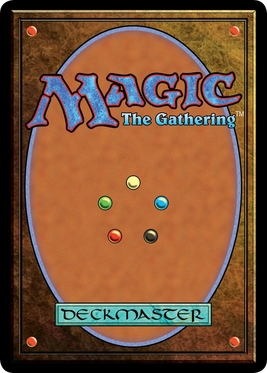
Blackjack is a casino banking game. It is the most widely played casino banking game in the world. It uses decks of 52 cards and descends from a global family of casino banking games known as Twenty-One. This family of card games also includes the European games Vingt-et-Un and Pontoon, and the Russian game Ochko. Blackjack players do not compete against each other. The game is a comparing card game where each player competes against the dealer.

Magic: The Gathering is a tabletop and digital collectable card game created by Richard Garfield. Released in 1993 by Wizards of the Coast, Magic was the first trading card game and had approximately thirty-five million players as of December 2018, and over twenty billion Magic cards were produced in the period from 2008 to 2016, during which time it grew in popularity.
Vampire: The Eternal Struggle is a multiplayer collectible card game published by White Wolf Publishing. It is set in the World of Darkness and is based on the Vampire: The Masquerade roleplaying game.
Meta is a prefix meaning "more comprehensive" or "transcending".
Gameplay of the collectible card game Magic: The Gathering is fueled by each player's deck of cards, which constitute the resources that player can call upon to battle their opponents in any given game. With more than 20,000 unique cards in the game, a considerable number of different decks can be constructed. Each card is designed to have certain strengths and therefore a significant part of the game is determined by which cards a player chooses to include in their deck. Broadly speaking, decks can be loosely classified based on their play style and mode of victory. The game's designers often explicitly create cards which are intended to fuel one or more of these given archetypes, in order to create competitive balance and diversity.
The SAGA System is a role-playing game system that uses "fate cards" to determine the effects of actions. The cards have numbers, suits, positive and negative states, and role-playing cues that guide the gamemaster in telling the story and administering the game. The system has been used in TSR, Inc.'s Dragonlance: Fifth Age game and the Marvel Super Heroes Adventure Game, later published by TSR. Sue Cook was the brand manager for both of those game systems, and helped design the SAGA game rules.

The World of Warcraft Trading Card Game is an out-of-print collectible card game based on Blizzard Entertainment's MMORPG, World of Warcraft. The game was announced by Upper Deck Entertainment on August 18, 2005 and released on October 25, 2006. Players can play against each other one-on-one, or can join others in order to defeat dungeon/raid "bosses" based on those in the MMORPG. In March 2010, Upper Deck lost the license from Blizzard Entertainment. The license was acquired by Cryptozoic Entertainment later in the month, with the company announcing that planned card sets would be released.
Metagaming is a term used in role-playing games, which describes a player's use of real-life knowledge concerning the state of the game to determine their character's actions, when said character has no relevant knowledge or awareness under the circumstances. This can refer to plot information in the game such as secrets or events occurring away from the character, as well as facets of the game's mechanics such as abstract statistics or the precise limits of abilities. Metagaming is an example of "breaking character", as the character is making decisions based on information they could not know and thus would not make in reality.
QuickStrike is an out-of-print collectible card game gaming system developed by Upper Deck for use in their games. This system made its initial debut in 2006.
The following outline is provided as an overview of and topical guide to games and gaming:
Metagame analysis involves framing a problem situation as a strategic game in which participants try to realise their objectives by means of the options available to them. The subsequent meta-analysis of this game gives insight in possible strategies and their outcome.

Magic: The Gathering – Duels of the Planeswalkers is a video game based on the popular collectible card game of the same name, published by Wizards of the Coast. It was released on June 17, 2009.

A game is a structured form of play, usually undertaken for entertainment or fun, and sometimes used as an educational tool. Many games are also considered to be work or art.

A collectible card game (CCG), also called a trading card game (TCG) among other names, is a type of card game that mixes strategic deck building elements with features of trading cards, introduced with Magic: The Gathering in 1993.
A non-player character (NPC), or non-playable character, is any character in a game that is not controlled by a player. The term originated in traditional tabletop role-playing games where it applies to characters controlled by the gamemaster or referee rather than by another player. In video games, this usually means a character controlled by the computer that has a predetermined set of behaviors that potentially will impact gameplay, but will not necessarily be the product of true artificial intelligence.
Drama theory is one of the problem structuring methods in operations research. It is based on game theory and adapts the use of games to complex organisational situations, accounting for emotional responses that can provoke irrational reactions and lead the players to redefine the game. In a drama, emotions trigger rationalizations that create changes in the game, and so change follows change until either all conflicts are resolved or action becomes necessary. The game as redefined is then played.

Game design is the process of creating and shaping the mechanics, systems, and rules of a game. Games can be created for entertainment, education, exercise, or experimental purposes. Increasingly, elements and principles of game design are also applied to other interactions, in the form of gamification. Game designer and developer Robert Zubek defines game design by breaking it down into its elements, which he says are the following:

Hearthstone is a digital collectible card game released by Blizzard Entertainment in 2014, available for Microsoft Windows and macOS PCs and iOS and Android smartphones. The game is free-to-play, with players gaining in-game currency and card packs via winning matches and completing quests, while real-world money can be spent to acquire additional card packs and cosmetic items. The game has been critically well-received and financially successful, estimated in August 2017 to earn nearly US$40 million per month. As of November 2018, Blizzard has reported more than 100 million Hearthstone players. Blizzard has continued to expand the game with the addition of multiple expansions, adventures and game modes.

Slay the Spire is a roguelike deck-building video game developed by American studio Mega Crit and published by Humble Bundle. The game was first released in early access for Microsoft Windows, macOS, and Linux in late 2017, with an official release in January 2019. It was released for PlayStation 4 in May 2019, for Nintendo Switch in June 2019 and for Xbox One in August 2019. An iOS version was released in June 2020, with an Android version released in February 2021.
A roguelike deck-building game is a hybrid genre of video games that combine the nature of deck-building card games with procedural-generated randomness from roguelike games.








